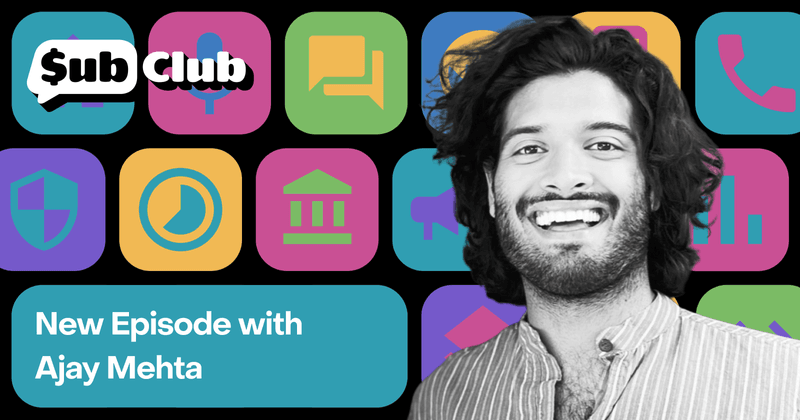Building a lovable alien and a $1M ARR AI app
Ajay Mehta explains how smart monetization and standout characters helped Tolan cut through the AI hype.

Unless you’ve been living under a rock, you’ve probably been hearing a lot of buzz about artificial intelligence (AI) in recent months. And to some extent, this is nothing new. People have been talking about the potential of computers and AI to revolutionize our lives since the 1980s. But for all the talk, this promise hasn’t really paid off.
According to Ajay Mehta, that’s about to change. Ajay is the founder and president of Portola, the company behind Tolan — an AI app that lets you create a personalized alien companion. Since its soft launch in late 2024, Tolan has reached 1M ARR, amassed more than half a million downloads, and achieved a 4.7 rating on the App Store. This week on the Sub Club podcast, we sat down to chat with Ajay about Tolan’s success and what it means for the current and future state of AI apps.
The AI revolution
Raise your hand if you’ve ever interacted with an AI-powered voice assistant or chatbot and been disappointed in the results. Everyone got a hand up? We’ve all experienced the frustration of trying to get AI to understand us and actually do what we want. But recent technology developments are getting us closer to the AI we’ve been promised. And this means new opportunities for product-market fit are emerging in spaces that didn’t exist before.
As Ajay points out, “What AI allows you to do is make a consumer experience that feels like there is something on the other side that knows you, understands you, and [provides a]… highly personalized experience.” Ajay and his Tolan co-founders Quinten Farmer and Evan Goldschmidt recognized this opportunity and decided to capitalize on it by creating an AI companion that actually feels authentic. Tolan users are having real-time, personalized conversations with their AI-powered alien buddy that carry emotional context — the kind of AI experience that simply wasn’t possible a year ago.
Competition and costs
One challenge of building AI apps is that the technology isn’t cheap. To facilitate fast, natural conversations, AI apps have to be able to look up past conversations, strike the right tone, and render responses in real time with low latency — all of which requires considerable computing resources. While this may sound like bad news, for Ajay and his team, this has actually been a good thing.
Two weeks into their soft launch, high operational costs forced the Tolan team to put up a paywall, which has helped shape the product. “Being forced because of high token costs to monetize relatively early on has actually been kind of a real help to both our growth and product development,” Ajay said. “Because we have paying customers, we can see when certain customers decide to renew for month two (or don’t) or month four or month six or whatever … it’s a much clearer signal than someone who stopped playing with the free app after 12 days.”
Another benefit of the high cost of AI infrastructure is that not everyone can build and operate an AI app, much less do it well. This means Tolan currently doesn’t have much competition, and a competitive moat.
Saving big with TikTok marketing
A big part of Tolan’s success comes down to its low-cost TikTok marketing strategy. By working with content creators and leveraging the fun personality of Tolan’s colorful cartoon characters, the team was able to drive major growth on social media. “Because the tones are so bright and visual, we were able to have a relatively low cost per install from the get-go, even on paid,” Ajay said. “But then when we started doing more organic stuff, especially on TikTok, we just noticed that the cost per install was going so low … it was a bit like, ‘Did a video go viral? We got 10,000 or 15,000 installs in a day.”
While not every app will go viral, there are some lessons to learn from Tolan’s success. Having memorable characters, animations, or interfaces can make your app instantly recognizable and amplify your app on social media and the app stores. Experimenting with different content types, posting often, and working with TikTok content creators can be an effective way to market your app — and if you’re lucky, one viral post can completely change your growth curve.
You might also like
- Blog post
The creative testing system that slashed our CAC (and scaled our spend)
We scaled Meta ad spend by 74.6% and dropped CAC 40%. Here’s how.
- Blog post
Why Your Apple Search Ads Attribution Is About to Spike—And What It Actually Means
How view-through attribution impacts your acquisition analytics
- Blog post
How four paywall redesigns boosted conversions and revenue
What actually worked when redesigning paywalls across fintech, gaming, and health.

